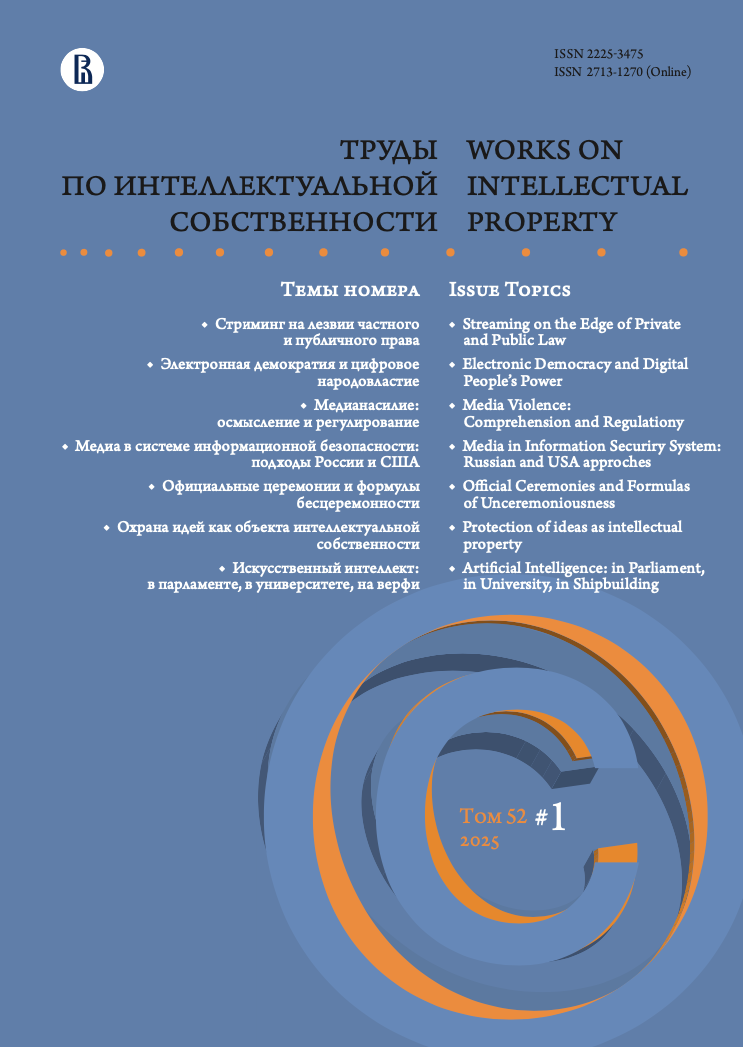EVOLUTION OF DOCTRINAL APPROACHES TO THE ROLE OF MEDIA IN INFORMATION SECURITY ISSUES IN THE RUSSIAN FEDERATION AND THE USA IN THE 21ST CENTURY
Abstract
The author discusses an actual problem of the media evolution in the doctrines of information security of Russia and the United States at the present stage. The research goal was to identify the main interpretations of the media in the current security doctrines of the two countries in the context of the historical transformation of their relations. The research objectives were to analyze the scientific literature and official documents of Russia and the United States devoted to the problem of ensuring information security, as well as to systematize and generalize the official positions of the two countries regarding the interpretation of the role of the media in the security system.
The research methodology includes a number of general scientific methods: synthesis, analysis, systematization, descriptive analysis, comparison, as well as the formal-logical method. The study also used such special methods as: historiographical analysis of the scientific discourse of the topic under study; the method of content analysis of doctrinal documents of Russia and the United States in the field of information security, as well as the method of qualitative analysis of the data obtained.
As a result, it was revealed that Russia is characterized by a defensive interpretation of the media within the framework of the modern understanding of information security, which is expressed in the relevant official documents in the field of cybersecurity and data protection. In the United States, the role of the media has evolved from an insignificant component of national security to an offensive weapon in information wars, which is also reflected in the doctrinal documents of this country.
Downloads
References
Динамика институтов информационной безопасности. Правовые проблемы. Институт государства и права РАН. М.: Канон, 2018. 264 с.
Калинин О.И., Приходько М.В. Контент-анализ как метод исследования информационной войны (на материале репрезентации китайско-американской торговой войны в медиадискурсе КНР и США) // Вестник Московского государственного лингвистического университета. Гуманитарные науки. 2023. № 12 (880). С. 39–47.
Конституция Российской Федерации (принята всенародным голосованием 12 декабря 1993 г. // Собрание законодательства Российской Федерации. 2009. № 4. Ст. 445.
ОБСЕ. Ежегодный доклад за 2020 г. — URL: http://www.scrf.gov.ru/security/information/document114/ (дата обращения: 16.05.2024).
Полякова Т.А., Камалова Г.Г. Концептуальные основания развития института доступа к информации в российской федерации при применении цифровых технологий // Мониторинг правоприменения. 2020. № 4 (37). С. 22–28.
Редкоус В.М. Некоторые вопросы совершенствования правового регулирования в области обеспечения информационной безопасности // Аграрное и земельное право. 2022. № 9 (213). С. 143–147.
Смирнов А.А. Обеспечение информационной безопасности в условиях виртуализации общества. Опыт Европейского Союза. М.: Юнити-Дана. 2017. 159 c.
Стрельцов А.А. Обеспечение информационной безопасности России. М.: Букинист, 2002. 296 с.
Сизьмин М.А. Информационная (информационно-психологическая) безопасность в структуре национальной безопасности (на примере США и России) // Baikal Research Journal. 2014. No 3. S. 20–25.
Мельник Г.С., Никонов С.Б. Медийный компонент в Доктрине информационной безопасности // Управленческое консультирование. 2018. № 1. C. 18–28.
Бухарин В.В. Сравнительный анализ нормативной базы по обеспечению информационной безопасности в США и РФ (конец XX — начало XXI в.) // iPolytech Journal. 2016. No 12. S. 4.
Провоторов И.А., Гайворонский М.А. Основные угрозы информационной безопасности при использовании социальных медиаресурсов в сети интернета // Экономика и социум. 2018. № 3 (46). C. 16–28.
Ромашкина Н.П. Вооружения без контроля: современные угрозы международной информационной безопасности // ИМЭМО РАН. 2018. № 2 (55). C. 23–49.
Указ Президента РФ от 5 декабря 2016 г. № 646 «Об утверждении Доктрины информационной безопасности Российской Федерации». — URL: https://base.garant.ru/71556224/ (дата обращения: 12.02.2024).
Указ Президента РФ от 2 июля 2021 г. № 400 «О Стратегии национальной безопасности Российской Федерации» // Собрание законодательства Российской Федерации от 5 июля 2021 г. № 27 (часть II) ст. 5351.
Amitav M.K. Technology and Security in the 21st Century. SIPRI Research Report. 2023. Vol. 2. P. 6–18.
Bao Khac Quoc, Nguyen Bao To. US-Russia geopolitical risk and corporate cybersecurity risk: Evidence from 10-K reports // Computer Science. 2021. Vol. 4. P. 58–69.
Nikiporets-Takigawa G., Buchnevb Т.V. Methodological Problems Concerning Concept’s Formation of the National Cybersecurity in the Russian Federation // Humanities and Social Sciences Bulletin of the Financial University. 2022. Vol. 12 (1). P. 70–74. DOI: https://doi.org/10.26794/2226-7867-2022-12-1-70-74
Pačková Pavlíkova, M. Russian Active Measures in Cyberspace through the Lens of Security Sectors // Politické vedy. 2023. Vol. 25(4). P. 55–61. DOI: https://doi.org/10.24040/politickevedy.2023.26.4.55-91
Paudel S. A Study on Russian Cyberwarfare Capabilities and Approach towards Cybersecurity. — URL: https://www.researchgate.net/publication/361420683_A_Study_on_Russian_Cyberwarfare_Capabilities_and_Approach_towards_Cybersecurity (accessed: 16.05.2024).
Pembecioglu N. Pandect Law in media culture: Snowpiercer analysis // Interciencia. 2023. Vol. 4. P. 34–59. DOI: https://doi.org/10.59671/Jf7wn
Sempa F.P. US security strategies from the Cold War to the 21st Century. 2nd Edition. 2022. P. 78–112.
Shallcross N.J. Social Media and Information Operations in the 21st Century // Journal of Information Warfare. 2017. Vol. 16. № 1. P. 8–10.
United States government. Office of Security. — URL: https://www.commerce.gov/osy/programs/information-security (accessed: 12.02.2024).
White House. National Cybersecurity Strategy Implementation Plan. URL: https://www.whitehouse.gov/wp-content/uploads/2024/05/National-Cybersecurity-Strategy-Implementation-Plan-Version-2.pdf (accessed: 12.02.2024).
Copyright (c) 2025 Works on Intellectual Property

This work is licensed under a Creative Commons Attribution-NonCommercial-NoDerivatives 4.0 International License.


